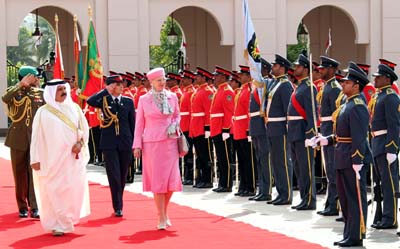Queen Margrethe II of Denmark visited Bahrain in February at the invitation of King Hamad ibn Isa Al Khalifa. As part of the official program, the queen honored Hamad with the “Storkorset af Dannebrog,” the second highest Danish royal order. Although the visit took place about two weeks before Bahraini authorities began a violent crackdown on protesters, Bahrain has long had a troubled human rights and press freedom record. The current crackdown includes serious attacks on the press.
The queen’s visit was not the only recent event in Bahrain creating headlines in Danish news media and in the human rights community. As CPJ reported last week, bloggers Abduljalil Alsingace and Ali Abdel Imam were convicted alongside prominent human rights activist Abdulhadi al-Khawaja in the Bahraini Court of National Safety, a special tribunal composed of civilian and military judges established after the imposition of martial law in March. Back in 1991, al-Khawaja obtained political asylum in Denmark and later received Danish citizenship. Al-Khawaja and his family returned to Bahrain in 2001, news reports said, and he continues to hold dual Bahraini-Danish citizenship.
Alsingace and al-Khawaja were sentenced to life imprisonment, while Abdel Imam was sentenced in absentia to 15 years in prison, the official Bahrain News Agency said. During the politicized trial it was clear this was not a simply a case against bloggers, human rights activists, and members of the political opposition. This was a trial intended to silence critical voices such as that of al-Khawaja, who has a long record defending the Bahraini people’s rights.
Al-Khawaja founded the Bahrain Center for Human Rights, which has been characterized by the International Research & Exchanges Board (IREX) as a strong defender of press freedom and the freedom of expression in Bahrain.
Al-Khawaja has defended the rights of the bloggers he has now been convicted alongside. In 2005, he said: “Ironically, the old press law did not include electronic media. But when the term ‘electronic media’ was inserted into the 2002 press law, this gave the authorities capacity to control electronic media without clear constraints.”
Last year, according to Danish-based International Media Support (IMS), al-Khawaja led the IMS-supported Arab Working Group in monitoring Bahraini media’s coverage of the country’s elections in October 2010. Jesper Højberg, executive director of IMS, described al-Khawaja as “a key player in the fight for human rights and a free and fair media in Bahrain.”
Al-Khawaja, who was arrested and badly beaten on April 9, was one of 21 people found guilty of antistate charges, most significantly “organizing and managing a terrorist group for the overthrow and the change of the country’s constitution and the royal rule” and “attempting to incite and solicit the overthrow and change the country’s constitution and royal rule by force.”
In May, Joe Stork, deputy Middle East director at Human Rights Watch, said: “It appears that Abdulhadi al-Khawaja’s jailers tortured him during the month they held him in incommunicado detention.” Human Rights Watch has documented the routine use of torture by Bahraini security officials during similar interrogations in political and security-related cases.
According to the Bahrain Center for Human Rights, al-Khawaja told his family about one of the instances of abuse when he was given a few minutes to talk with them after a May 16 hearing. That week, al-Khawaja said, he was driven to an undisclosed location where he was questioned, in a room with a video camera, by a man who said he represented the king. The man asked al-Khawaja repeatedly to apologize to the king. When al-Khawaja refused, he was taken to another room where four men threatened to rape him and rape his daughter, human rights defender Maryam al-Khawaja. The four men undressed themselves and groped al-Khawaja, he said.
Back in February, the Danish newspaper Politiken said, the Danish queen told reporters at a press conference in Bahrain that she did not see “any reason” to reconsider her visit in the country. The queen continued: “In Bahrain, it is obvious they worry about the situation in the entire region. It was evident; the King is paying attention to what is going on.”
